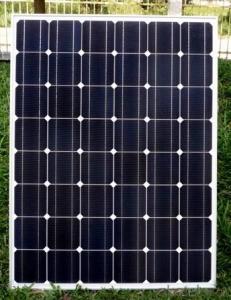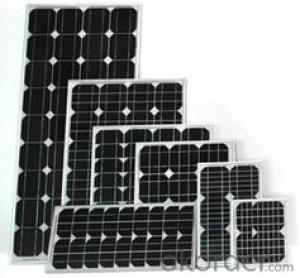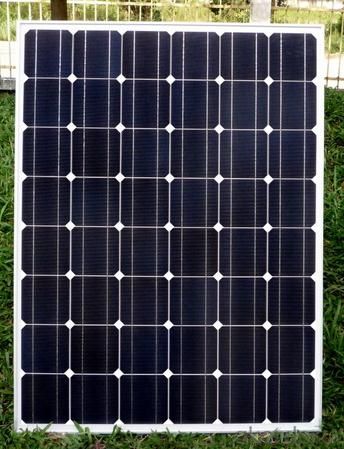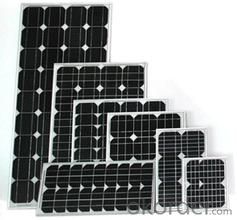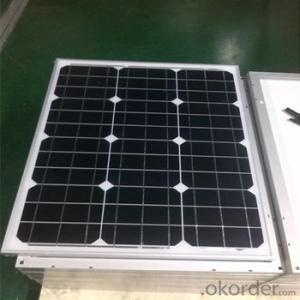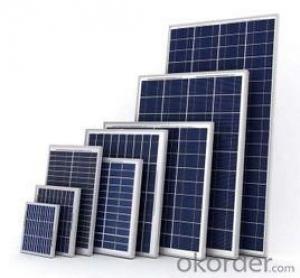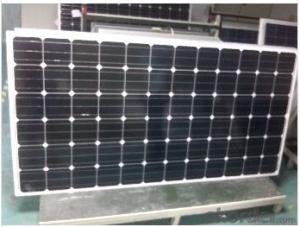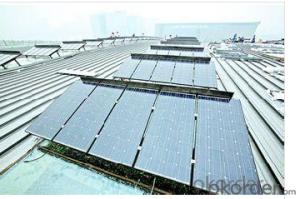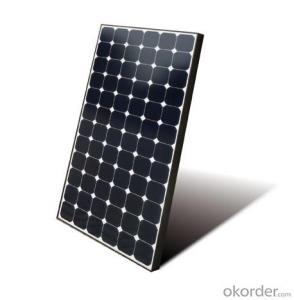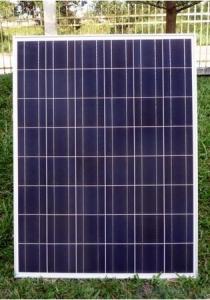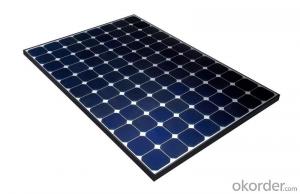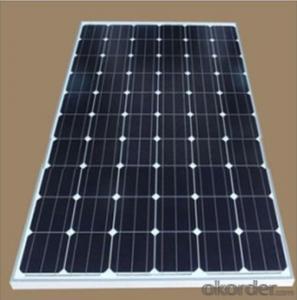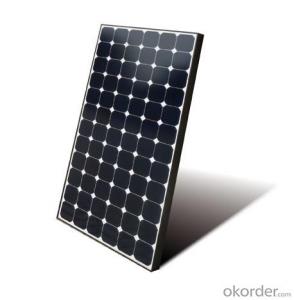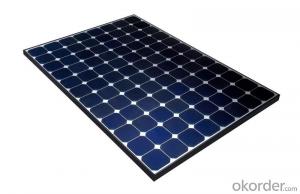Flexible Solar Panels - CNBM Poly 160W Solar Panel with TUV UL CE Certificate for Residential
- Loading Port:
- China main port
- Payment Terms:
- TT OR LC
- Min Order Qty:
- 500 watt
- Supply Capability:
- 1000 watt/month
OKorder Service Pledge
OKorder Financial Service
You Might Also Like
Specification
CNBM Poly 160W Solar Panel with TUV UL CE Certificate For Residential
Introduction
This is a kit using for factory and storage field. This product is a higher output version with stable power and we guarantee you for 20years.
Each module is rated by its DC output power under standard test conditions, and typically ranges from 100 to 365 watts. The efficiency of a module determines the area of a module given the same rated output – an 8% efficient 230 watt module will have twice the area of a 16% efficient 230 watt module. There are a few solar panels available that are exceeding 19% efficiency. A single solar module can produce only a limited amount of power; most installations contain multiple modules. A photovoltaic system typically includes a panel or an array of solar modules, a solar inverter, and sometimes a battery and/or solar tracker and interconnection wiring.
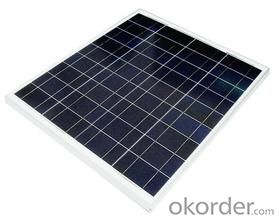
Suggested application
Home lighting business lighting,
Garden lighting, pavement lighting
Farmer household lighting
Decorative water pump
Traffic signal lighting
Industry area
Business area
Solar Power Plant
Product feature
Modules are made of Monocrystalline or Polycrystalline Silicon cell.
Materials and color of the solar panel frame: Clear anodized aluminum alloy type 6063T5 Universal frame; Silver-white color;
The output connection gathers the coupling: Selects conforms to the IEC-612615; 2005, class II, IEC61730 international standard; Airtight waterproofing binding clamp;
Module seal structure: The surface is thick, the high diaphanous rate armored glass with solar cell board special-purpose 3.2mm becomes after the high temperature lamination craft. The back selects has waterproof and anti- aged performance fine TPT materials. The entire block battery board has, the waterproofing, the anti- aging airtight and so on the fine performance;
Power tolerance: +/-3%
Packaging
International standard cartons (according to the requirements of customers)
- Q: I've seen a couple homes around my town that have solar power and I live in the Desert, where the sun is shinning and it gets really hot during the summer. We run our air conditioner a lot making our electricity bill high.So I just wanted to know if anyone has or knows anyone that has solar panels? are they worth getting and is it the same as having electricity?
- and, if given the tax credits, you'll see a faster return on investment in CA than I would have in Western PA (I was given a 0 year return number without factoring any tax credits). Plus you'll be doing something good for the environment. My brother put his house for sale which had solar panels for hot water, and was offered good money for the solar panels independent of selling the house. If anyone has a any no answer that doesn't involve the initial expense, I'm looking forward to reading it.
- Q: Can solar panels be installed on a shipping container?
- Yes, solar panels can be installed on a shipping container. In fact, many people and businesses are now utilizing shipping containers as a platform for solar installations due to their portability and ease of installation.
- Q: Can solar panels increase the value of commercial properties?
- Yes, solar panels can increase the value of commercial properties. Installing solar panels can lower operating costs by reducing electricity bills and often generate additional income through selling excess energy back to the grid. This can make the property more attractive to potential buyers or tenants and result in higher property values. Additionally, solar panels are seen as a sustainable and environmentally-friendly investment, which can further enhance the property's value in today's eco-conscious market.
- Q: cheapest price for a 20 watt solar panel sold on line
- If okorder /... , cost $75 each. I haven't personally tried that product, but the company has been around for a long time, and is not a fly-by-night. If it has to last, there are dozens of places online that will sell conventional sealed panels. Expect to pay $2.00 a watt on up nowadays.
- Q: What do these mean? I'm interested in doing a solar panel project. The problem is I know nothing about electricity, wiring, or panels so I've bought a small panel to experiment with first.I don't know what amps, watts, or volts are; what I should be reading on the batteries I will be charging? Or on the small appliances I will be running?The panel I bought has four settings:. 3V ---- 200mA2. 6V ---- 00 mA3. 9V ---- 50mA4. 2V ---- 50 mA(What is mA?)Also, will you give examples of what I can run with this? Make up any scenarios with whatever amps/volts/watts.
- okorder / to see our solar panel project.
- Q: What is the maintenance cost of solar panels?
- The maintenance cost of solar panels is relatively low. Regular cleaning and inspection are recommended to ensure optimal performance, but typically, the cost of maintenance is minimal compared to the savings generated by solar energy.
- Q: how to make electricty using solar panels or wind generator
- there's a e book called hand-crafted potential that covers making photo voltaic cells and panels. some extra progressive libraries have it. in the different case its a visit to the OKorder save (which style of kills the finished loose deal). in case you meant warmth air panels or warm water panels then there are extremely some books interior the library that cover that subject. mom Earth information mag also has had many articles on both photo voltaic/electric powered and photo voltaic warmth panels. in the journey that your library consists of adult males mag and keeps decrease back subject matters of their stacks.
- Q: Where in the world are solar panels used. If it is used widespread across a continent just say which continent, other than that, just name the country. So where are solar panels used often?
- Solar panels can be used anywhere in the world. The only requirement is that there is sufficient sunlight to power the solar panels and in many developing countries, solar energy is used to heat water.
- Q: Me and my friend have made our own functional solar panels for considerably less than retail prices and we are thinking about selling them. Are there any legal issues regarding this? Would I need any special licenses or anything? Would using brand name components or parts in the panels make any difference legally? I want to know before I just go out and start doing it. Thanks!
- They are your property. If you want to sell them, have at it. Of course, as soon as the government sees you making some money, they will descend on you like hyenas for ;their 'share'. If you apply and get a 'commercial' permit, they will be in you pocket in a flash. The government will steal anything they can get their hands on. They use 'zoning laws' to carry out their ruse. Then they call themselves your 'partner'. Same as the mafia does. They have a lot of worthless bureaucrats that want somebody else's money. In California, most of the government workers seem to be communists. They hate business and are extremely jealous of any entrepreneur. They think they are experts on Fair business Practices. Most of them have never worked an honest days work in their life. Let alone think up an idea such as yours.
- Q: Are solar panels affected by shade?
- Yes, solar panels are affected by shade. Shade can significantly reduce the efficiency and output of solar panels as shading obstructs sunlight, which is necessary for generating electricity. It is important to install solar panels in areas with minimal shade to maximize their performance and efficiency.
Send your message to us
Flexible Solar Panels - CNBM Poly 160W Solar Panel with TUV UL CE Certificate for Residential
- Loading Port:
- China main port
- Payment Terms:
- TT OR LC
- Min Order Qty:
- 500 watt
- Supply Capability:
- 1000 watt/month
OKorder Service Pledge
OKorder Financial Service
Similar products
Hot products
Hot Searches
